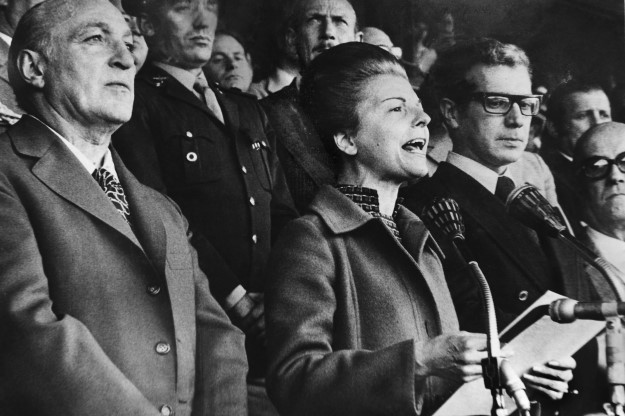This article is adapted from AQ’s latest issue on the politics of water in Latin America
For José López Rega, the stroke of luck was moving in to live with General Juan Domingo Perón and his wife, Isabel, in Spain in 1965. At the time, his life didn’t promise more than a frustrated marriage, his practice as a spiritual guide known for darkness more than divinity, and afternoon card games at a local social club in Buenos Aires. In a matter of years, the street cop who took early retirement would become the most powerful man in Argentina.
If it weren’t for the crimes in which he was involved, his story may have been told as an act of late-life resurgence.
Since the election of Brazil’s Jair Bolsonaro, the self-proclaimed philosopher and former astrologer Olavo de Carvalho has emerged as a highly influential figure in government and in the Brazilian culture war. Yet five decades before him, another controversial guru was driving politics in the country next door.
López Rega was 49 and had no expectations beyond printing his esoteric manuscripts. Until the unexpected occurred: He met Isabel Perón while she was traveling through Argentina.
It happened during a meeting of the secret society Anael, a group of men determined to work for the return of General Perón from a “spiritual and political” platform.
On that day, Isabel picked out López Rega from the rest of the group and made him her personal assistant. “Prophet Daniel,” as she would call him, was brought to Madrid to live with Isabel and Perón. They gave him the maid’s quarters on the first floor. He became the house butler.
And who was Perón at the time? A widely popular general who had governed Argentina for nine years, starting in 1946, until forced into exile. Navy planes had bombarded the presidential palace and the military removed him from power in 1955. They prohibited his return to Argentina and banned the Peronist movement.
The consequences were catastrophic: political instability, social uprisings, the formation of guerilla groups. A Peronist organization called Montoneros kidnapped and killed General Pedro Eugenio Aramburu, a former president and one of the men responsible for ousting Perón. The Montoneros issued a call to arms for Perón’s return from exile. After several years, the pressure from guerrilla groups and mass mobilizations cleared the path, and the military allowed Peronism to form a party and participate again in elections.
Perón returned after 17 years of exile and won elections in 1973, but an ideological schism had already formed between his followers. Peronism was battling its own cold war between a revolutionary left and authoritarian conservatives, a violent internal struggle that began settling differences with bombs and firearms. Opposing sides became radicalized. Back in power, Perón was either unable or didn’t know how to control the factions supporting him. He died less than a year after becoming president and left his wife Isabel, formerly vice president, in power.
Isabel would seek out the emotional and spiritual support of “Prophet Daniel” more than ever. He had been appointed minister of social welfare by Perón, but the guru soon became a mix of de facto prime minister and personal assistant to the president. Isabel depended on his counsel for every decision. He set up his desk in the hall leading into her office, acting as a receptionist who granted or denied access to the president. It may seem like an Italian comedy film, but his interventions had an impact on all areas of the government.
López Rega was seated at the height of power. And he was a feared man.
He wielded political power through his position — building homes, distributing resources, performing solidarity actions — while he assembled the paramilitary Argentine Anticommunist Alliance, or Triple A. The function of the clandestine organization was to use the most violent methods to eliminate “the internal enemy that has infiltrated Peronism.”
After several months, the terror was indiscriminate. Fear seeped into Argentine society like in a nightmare. No one felt safe, and anyone could be the next victim. The teaching method of the Triple A was to display the bodies of its victims. They appeared with bullet wounds on the street, in vacant lots, tied up with wire, or in burnt-out cars — more than 2,000 deaths.
After ousting Isabel Perón in 1976, the military would go on to build secret camps to hold kidnapped people before making them “disappear,” escalating the violence to unprecedented levels of state terror. But the first step toward illegal repression was taken by López Rega in a democratic government. He wasn’t the only one, either. A portion of the Peronist leadership, immersed in the ideological battle, agreed with his “mission for purification” to save the country, even though they despised him personally.
Many years later, the Peronist party would try to present López Rega as an outsider, a figure on the margins, a fluke of history, in an attempt to wash away their own responsibility. What is true is that the frustrated spiritual guide, who had once dreamed of being a tenor singer, left Argentina in 1975, as other forces within the cabinet were waging a war against him and his overwhelming influence over the president. He stayed in hiding under a different identity for more than a decade in Spain, Switzerland, and the United States. He was married to a dilettante pianist and singer and passed his time performing domestic chores and writing texts on Hindu teachings.
In 1986, his wife, assuming that no one remembered him or was searching for him, began the paperwork for his passport in the Argentine consulate in Miami. It sounded the alarms. López Rega escaped to the Bahamas, but was finally trapped by three FBI agents. He died in prison in Argentina in 1989, without ever being sentenced.
—
Larraquy is an Argentine journalist, author and biographer of López Rega








